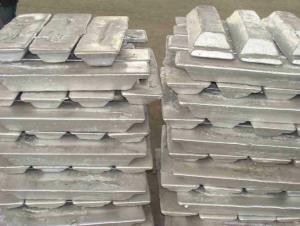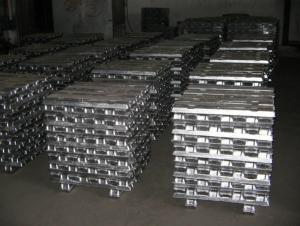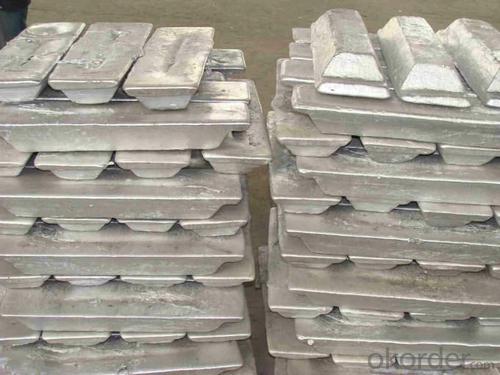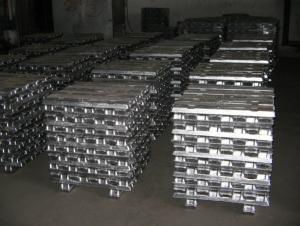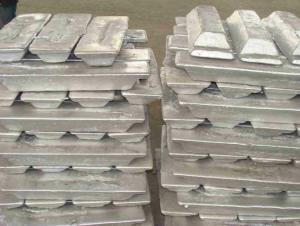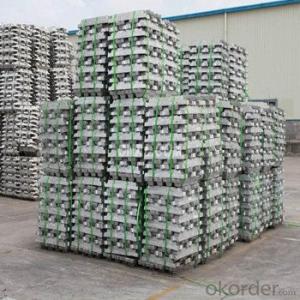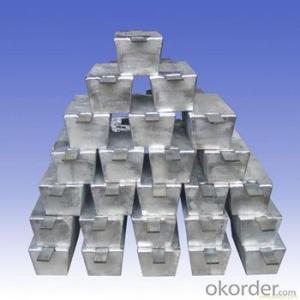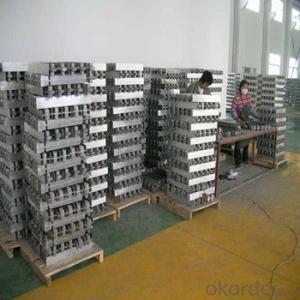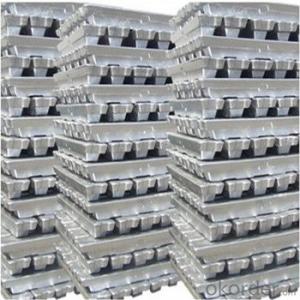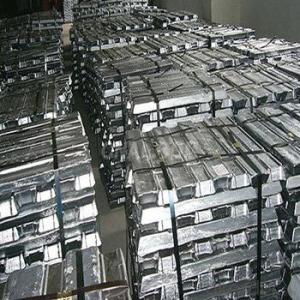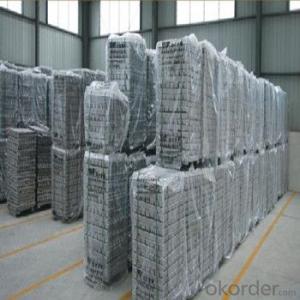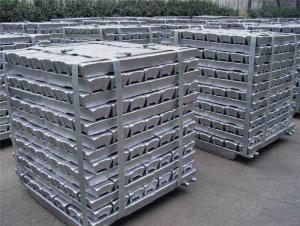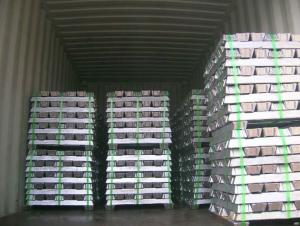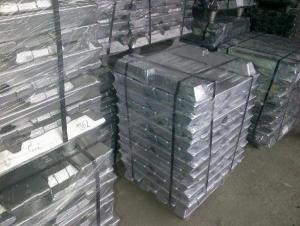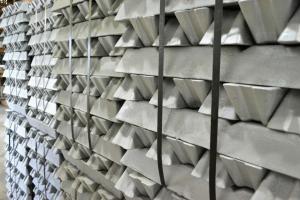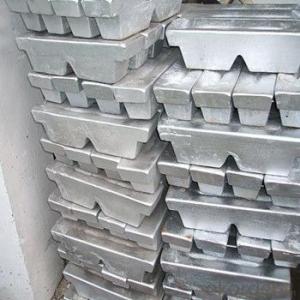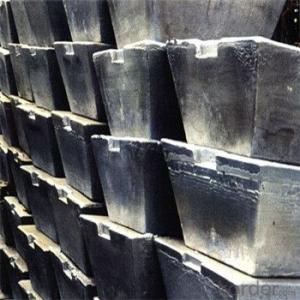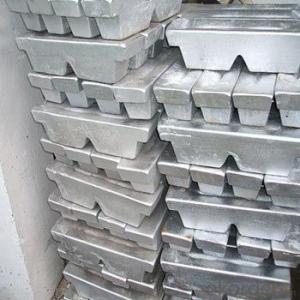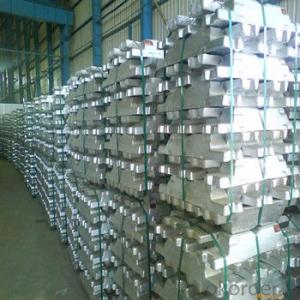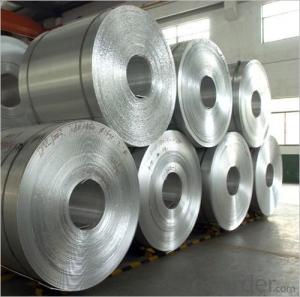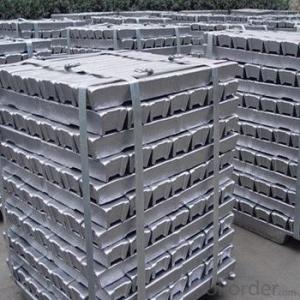Aluminum Ingots AA1100
- Loading Port:
- Shanghai
- Payment Terms:
- TT or LC
- Min Order Qty:
- 20 Tons m.t.
- Supply Capability:
- 1000 Sets Per Month m.t./month
OKorder Service Pledge
OKorder Financial Service
You Might Also Like
1. Specifications of Aluminum Ingots AA1100
Product Name | Aluminum Ingot |
Chemical Composition | Al |
Weight | 20/25kg |
Al (Min) | 99%-99.9% |
Appearance | silvery white |
Advantages | easy control and operation, fast melting |
Chemical composition of Aluminum Ingot AA1100:
aluminum ingot (AL>99.0%)
Grade | Chemical Composition % | |||||||||
Al≥ | Si | Fe | Cu | Ga | Mg | Zn | Mn | others | Sum | |
Al99.9 | 99.90 | 0.50 | 0.07 | 0.005 | 0.02 | 0.01 | 0.025 | - | 0.010 | 0.10 |
Al99.85 | 99.85 | 0.80 | 0.12 | 0.005 | 0.03 | 0.02 | 0.030 | - | 0.015 | 0.15 |
Al99.7 | 99.70 | 0.10 | 0.20 | 0.010 | 0.03 | 0.02 | 0.030 | - | 0.030 | 0.30 |
Al99.6 | 99.60 | 0.16 | 0.25 | 0.010 | 0.03 | 0.03 | 0.030 | - | 0.030 | 0.40 |
Al99.5 | 99.50 | 0.22 | 0.30 | 0.020 | 0.03 | 0.05 | 0.050 | - | 0.030 | 0.50 |
Al99.00 | 99.00 | 0.42 | 0.50 | 0.020 | 0.03 | 0.05 | 0.050 | - | 0.050 | 1.00 |
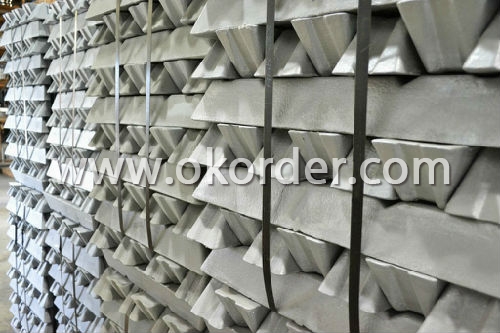
2. Usage/Application of Aluminum Ingots AA1100
1.mainly used for melting ingot
2. discontinuous melting with scrap
3. easy control and operation
4. fast melting
5. Used for industry such as automobile,pinning and weaving,electron broadly and so on
3.Packaging & Delivery of Aluminum Ingots AA1100
About 25Kg /Ingot, Packed in wooden case, Net weight 1000Kg/ Case, or as customer's requirements.
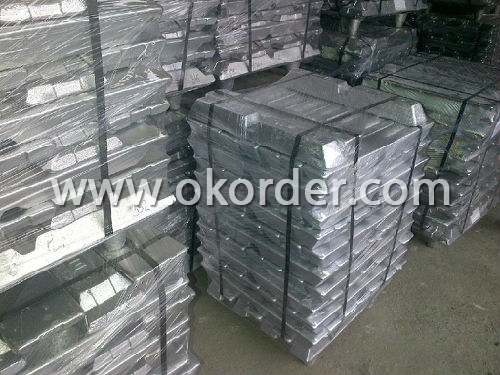
- Q: What is the role of aluminum ingots in the production of aircraft engines?
- Aluminum ingots play a crucial role in the production of aircraft engines as they are used to manufacture various engine components. Aluminum, being lightweight and possessing excellent thermal conductivity and corrosion resistance, is an ideal material for aircraft engines. The ingots are melted and cast into different shapes to create parts such as engine casings, pistons, cylinder heads, and other structural components. These ingots provide strength and durability while helping to reduce the overall weight of the engine, resulting in improved fuel efficiency and performance of the aircraft.
- Q: How are aluminum ingots used in the production of building facades?
- The production of building facades heavily relies on the essential properties and versatility of aluminum ingots. These ingots enable the creation of lightweight, durable, and aesthetically pleasing facades in modern architecture. To begin, aluminum ingots are melted and cast into various shapes and sizes according to the specific design requirements of the building facade. This casting process ensures that the aluminum can be easily manipulated and fabricated into different facade components. Once cast, the ingots can be extruded or rolled into sheets, panels, or profiles. These aluminum sheets or panels are then cut, shaped, and assembled to achieve the desired facade design. The malleability of aluminum allows for intricate designs and customization options, enabling architects to bring their creative visions to life. One of the major advantages of aluminum ingots in building facades is their lightweight nature. With a low density, aluminum is significantly lighter than other metals like steel. This characteristic reduces the overall weight of the facade, making installation easier and decreasing the load on the building structure. Moreover, the lightweight property of aluminum facilitates the creation of larger and more expansive facade designs, opening up greater design possibilities. Furthermore, aluminum ingots possess excellent corrosion resistance, a crucial attribute for building facades exposed to different weather conditions. The natural oxide layer that forms on the surface of aluminum protects it from rust and corrosion, ensuring the facade's longevity and durability. This resistance to corrosion reduces maintenance costs and extends the lifespan of the building facade. Additionally, aluminum ingots offer high thermal conductivity, which plays a significant role in effective thermal management for building facades. By helping regulate temperature and reducing energy consumption, aluminum facades contribute to sustainable building practices. These facades can also incorporate insulation materials to enhance energy efficiency. In terms of aesthetics, aluminum ingots provide a wide range of finishing options. They can be anodized, painted, or coated in various colors and textures to achieve the desired appearance. Aluminum facades can also be combined with other materials like glass or stone to create visually striking and modern facades that enhance the overall architectural design. In conclusion, the extensive use of aluminum ingots in building facades is due to their lightweight nature, corrosion resistance, thermal conductivity, and design versatility. These properties empower architects and designers to create durable, energy-efficient, and visually appealing facades that align with modern architectural trends.
- Q: What is the process for smelting aluminum ingots?
- Smelting aluminum ingots consists of several steps. To start, bauxite ore, which serves as the main aluminum source, is mined and refined to extract impurities. The refined bauxite is then converted into alumina using the Bayer process. Following that, a large electric furnace is utilized to combine the alumina with cryolite and other additives. This mixture is subjected to extremely high temperatures, reaching approximately 1,800 degrees Celsius. The intense heat causes the alumina to melt and separate into aluminum and oxygen. Subsequently, the molten aluminum is tapped from the furnace and transferred to either a holding furnace or a ladle. During this stage, it is common to alloy the aluminum with other metals to enhance its properties. Common alloying elements include magnesium, silicon, copper, and zinc. Once the desired alloy composition is attained, the molten aluminum is poured into molds to create ingots. These molds are typically constructed from steel and can vary in size and shape based on specific requirements. After the aluminum has solidified and cooled, the ingots are extracted from the molds and undergo further processes such as heat treatment or rolling to achieve the desired mechanical properties and shape. In summary, the smelting process of aluminum ingots encompasses mining and refining bauxite, converting it into alumina, melting the alumina to separate aluminum and oxygen, alloying the molten aluminum, pouring it into molds, and finally processing the solidified ingots to achieve the desired properties.
- Q: What are the advantages of the CNC process for aluminum and die cast aluminum?
- Aluminum processing, aluminum and other common such as screen. It is used extrusion process, that is, aluminum ingots and other raw materials in the melting furnace, after extrusion extruder extrusion die molding, it can also extrude a variety of profiles of different sections.
- Q: What are cooked aluminium ingots and aluminium ingots? What specifications do they have?
- Comparison of pure aluminium, aluminium containing up to 99.3% - 99.7%, such as iron, silicon, copper content of impurities is less than 1%, aluminum boxes, aluminum pot, aluminum sheet for daily use is cooked made of aluminium.
- Q: Analysis of die casting aluminium ingot
- Non standard ingot ingredients as follows. (general non-standard zinc die-casting aluminum ingot will exceed the standard in 2-3, such as: Japan) ADC12Z (zinc below 3) silicon slightly low, other elements are close to ADC12. (GB aluminum standard available, here no longer).
- Q: What are the different surface treatments for aluminum ingots?
- Depending on the desired outcome and application, there are various surface treatments available for aluminum ingots. Some commonly used treatments include: 1. Anodizing: By creating a protective oxide layer, anodizing offers corrosion resistance, durability, and improved aesthetic appearance. 2. Powder coating: This treatment involves applying a dry powder to the ingot's surface, which is then cured under heat to form a protective and decorative coating. It provides excellent resistance to corrosion, fading, scratching, and offers a wide range of color options. 3. Polishing: Achieved through mechanical buffing, polishing creates a smooth and glossy finish. It enhances the appearance and improves corrosion resistance. 4. Brushing: This treatment utilizes abrasive brushes to create a textured or brushed finish, often for decorative or industrial purposes. It also provides corrosion resistance. 5. Chemical etching: By selectively removing material from the surface, chemical etching can create intricate patterns, logos, or text. It is suitable for branding or decorative purposes. 6. Clear coat: Applying a clear coat adds an extra layer of protection against corrosion while preserving the natural appearance of the metal. Clear coats often contain additives that enhance longevity. To determine the most suitable surface treatment for aluminum ingots, it is important to consider the specific requirements of the application and seek advice from professionals in the field.
- Q: How are aluminum ingots used in the production of window frames?
- The production of window frames heavily relies on aluminum ingots, which play a crucial role. To begin with, these ingots are melted and shaped according to the specific requirements of the frames. The melting process involves heating the ingots in a furnace until they reach their melting point of approximately 660 degrees Celsius. Once the aluminum is molten, it is poured into molds designed to achieve the desired shape of the window frame. Afterward, the molten aluminum is left to cool and solidify, resulting in a solid frame made of aluminum. The choice of aluminum ingots for this process is due to their exceptional properties. Aluminum is not only lightweight but also sturdy and durable, making it an ideal material for window frame production. Additionally, its corrosion-resistant nature is particularly important for outdoor window frames exposed to diverse weather conditions. Once the aluminum frames have solidified, they undergo further processes to meet the specific requirements and design of each window frame. These processes may include cutting, shaping, and finishing, which often require the use of specialized tools and machinery. They are necessary to create the appropriate openings for glass panels, hinges, locks, and other hardware. After the necessary modifications, the window frames are typically coated with protective finishes, such as powder coating or anodizing, to enhance both their appearance and durability. These finishes serve as an additional layer of protection against corrosion, ensuring that the frames can withstand years of use without deteriorating. In conclusion, aluminum ingots are indispensable in the production of window frames. They are melted, shaped, and further processed to create frames that are lightweight, sturdy, and resistant to corrosion. Furthermore, the frames undergo coating and finishing processes to enhance their visual appeal and longevity.
- Q: How are aluminum ingots used in the production of solar panels?
- The production of solar panels heavily relies on aluminum ingots, playing a vital role in their construction. These ingots are primarily utilized in the frame and mounting structures of the panels. The frame of a solar panel has the important responsibility of providing structural support and safeguarding the delicate photovoltaic (PV) cells. Aluminum ingots are the preferred choice for constructing the frame due to their exceptional strength-to-weight ratio and resistance to corrosion. This ensures that the solar panels can endure harsh weather conditions and maintain their durability throughout their lifespan. Apart from the frame, aluminum ingots are also used in the mounting structures of the solar panels. The mounting structure is responsible for securely attaching the panels to rooftops, ground mounts, or other surfaces. Aluminum ingots are an ideal option for these structures as they are lightweight, making them easier to handle, transport, and install. Moreover, aluminum is a highly recyclable material, making it an environmentally friendly choice for solar panel production. By incorporating aluminum ingots, manufacturers can significantly reduce the carbon footprint associated with the production process. Overall, aluminum ingots are indispensable in the production of solar panels as they provide structural integrity, corrosion resistance, lightweight properties, and environmental sustainability. Their utilization in the frame and mounting structures enhances the overall performance and longevity of solar panels, thereby contributing to the growth of the renewable energy sector.
- Q: How to calculate the price with or without ticket in the aluminum ingot trade? Does the invoice price increase with aluminum?
- As to whether the invoice price fluctuates with the fluctuation of the aluminium ingot price, this is also the prior agreement between the seller and the buyer. Generally, the bulk of the sensitive price goods will be agreed on a floating price, that is, the price of the settlement, the market price of floating and floating.
1. Manufacturer Overview
| Location | Henan,China |
| Year Established | 1993 |
| Annual Output Value | Above US$200 Million |
| Main Markets | Mid East;Eastern Europe;North America |
| Company Certifications | ISO 9001:2000;ISO 14001:2004;OHSAS 18001 |
2. Manufacturer Certificates
| a) Certification Name | |
| Range | |
| Reference | |
| Validity Period |
3. Manufacturer Capability
| a) Trade Capacity | |
| Nearest Port | Shanghai |
| Export Percentage | 30%-50% |
| No.of Employees in Trade Department | 21-50 People |
| Language Spoken: | English;Chinese |
| b) Factory Information | |
| Factory Size: | Above 100,000 square meters |
| No. of Production Lines | Above 10 |
| Contract Manufacturing | OEM Service Offered;Design Service Offered |
| Product Price Range | Average |
Send your message to us
Aluminum Ingots AA1100
- Loading Port:
- Shanghai
- Payment Terms:
- TT or LC
- Min Order Qty:
- 20 Tons m.t.
- Supply Capability:
- 1000 Sets Per Month m.t./month
OKorder Service Pledge
OKorder Financial Service
Similar products
Hot products
Hot Searches
Related keywords
